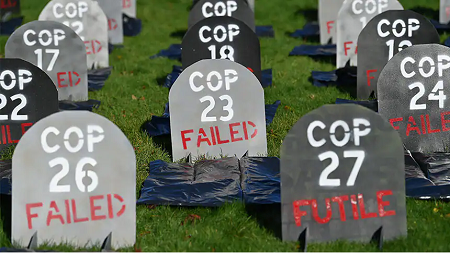Climate Justice: From Procrastination in Glasgow to Hope at Sharm al-Sheikh

A forward-looking view of CoP26 from the MENA region by Hala Subhi Murad, Dibeen Association (Jordan)
Let`s start with a question, the results of which became clear and evident at the beginning of the second week of the Conference of the Parties to the Climate Change Convention CoP26: Did the parties actually meet in order to come up with binding and viable solutions? Or just to show off?
No one has a definitive answer to these questions, but we find many responses to them from various points of view. What is certain here is that Glasgow has brought us back to scenarios of procrastination, delay and stagnation, especially with regard to the most-affected and poorest peoples in the world.
The absence of justice in this conference was not only in its outcomes, but started from the moment of preparations after civil society institutions realized that Glasgow would be a new low in the history of climate conferences, especially in light of the strict COVID-19 procedures, which imposed the absence of many activists and leaders.
Complications and obstacles began to appear in conjunction with the stage of organization and preparation, which led many global networks and climate activists to request the postponement of the conference. However, these demands were not heeded, and all were rejected.
The conference was launched at the beginning of November and, during the second day, a new pledge related to forests and lands was announced and signed by more than 130 countries, followed by a pledge regarding the transition toward clean energy signed by about 40 countries. The speeches of the leaders were resonant, strong, clear and loud, announcing the beginning of a new era of work.
The first week ended in this enthusiastic atmosphere, but its fire subsided during the second week, which dampened hope, as the powerful spoke their word—the word of abandoning responsibilities under a common heading: “There is no way out of this crisis.”
It became clear to us that the situation would remain, that we should not go beyond the 1.5°C threshold, that we gradually, but indefinitely reduce the use of coal, that we preserve the oceans and start a dialogue about them, that we have to work for nature, the land and local communities. To ensure the fair transition of clean energy, the titles are general and loose, and have no legitimacy except that they will cite the Glasgow Document as practically worthless.
Today, we look toward tomorrow, hoping for the CoP27 conference, hoping that it will make a difference, at least in form, as it will be held in one of the countries of the South, specifically in the African continent, and within the Mediterranean basin in an Arab country located in the Middle East. These regions are considered among the most affected by climate changes. As of today, they suffer from desolation, land degradation, direct losses of nature, forests and marine diversity. They face the threatened disappearance of some coastal cities, especially historic Alexandria.
All of these reasons lead us to a requisite optimism that revives within us the certainty that weaker countries may have the opportunity to extract their rights to live and continue and work to map of demands and gains to prevail with a direct financial facility concerned with losses and damages. Already, we face today an existential challenge and direct human rights violations in life and pension, specifically for the population in rural and remote areas, unsustainable and overcrowded cities, coastal areas and others.
Within a year from now, the efforts of global civil society institutions must be intensified to raise the word of climate justice and open expanded dialogues at all levels related to the human rights approach in dealing with the climate issue, especially after the recent Human Rights Council decision to appoint a Special Rapporteur on climate change and human rights, which should open the doors wide to identify responsibilities and find accountability mechanisms that would be binding tools for all states parties to climate agreements and environmental agreements. All of this requires sincere and unremitting efforts, if we want a just and sustainable solution within the next CoP and away from the usual grandstanding, gossip and tourism.
Photo: Fake headstones are lined up in Glasgow, Scotland, as a symbol of all the CoP conferences since 1992. Source: Paul Ellis/AFP/Getty Images.
|